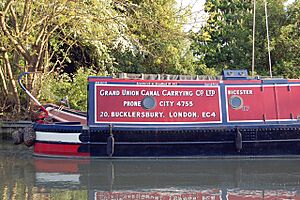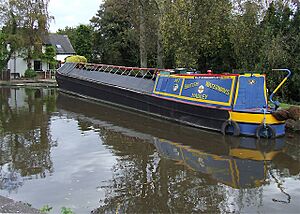Grand Union Canal Carrying Company facts for kids
The Grand Union Canal Carrying Company was a business in England that moved goods using boats on canals. It operated from 1934 to 1948. This company played a big part in transporting things across England during its time.
How the Company Started
In 1929, the Regent's Canal company bought the Grand Junction Canal. This led to the creation of a brand new company called the Grand Union Canal. Later that same year, the new Grand Union Canal company also bought the Warwick Canals.
A few years later, in 1932, the Grand Union Canal company expanded even more. They bought the Leicester and Loughborough Navigations and the Erewash Canal. This cost them a lot of money, around £75,000.
For the first time, one company owned almost the entire main waterway route. This route stretched all the way from London to Birmingham and even connected to the River Trent. The only part they didn't own was a small section of the Oxford Canal. The Grand Union Company tried to buy this part too, but they couldn't reach an agreement.
The Grand Union Canal was now very long, stretching over 300 miles! A main goal for the company was to make this route wide enough for large 14-foot barges. It could also carry two narrowboats side-by-side from London to Birmingham.
Forming the Carrying Business
To handle the actual transport of goods, the Grand Union Canal company bought another business called Associated Canal Carriers Ltd. In 1934, they officially started the Grand Union Canal Carrying Company Ltd. You could often see their boats marked with "GUCCC," which was a short way of writing the company's name.
The company found new types of goods to transport in the 1930s. To carry all this new cargo, they needed more boats. They ordered many new boats from different builders. These included W.J. Yarwood & Sons in Northwich, Harland and Wolff in Woolwich, and W.H. Walker and Brothers in Rickmansworth.
Eventually, the company had about 186 pairs of boats. These boats had a new and improved design. People gave these boats fun nicknames based on where they were built. They were called "Woolwichs," "Northwichs," and "Rickys."

End of the Company
When World War II began, many men who worked on the canals left to join the war effort. This made it hard for the company to operate. In 1942, the Ministry of War Transport took control of the company's operations.
During the war, the company lost money. After the war, on January 1, 1949, the British Transport Commission took over all the company's boats and other assets. This marked the end of the Grand Union Canal Carrying Company.

 | William Lucy |
 | Charles Hayes |
 | Cleveland Robinson |

